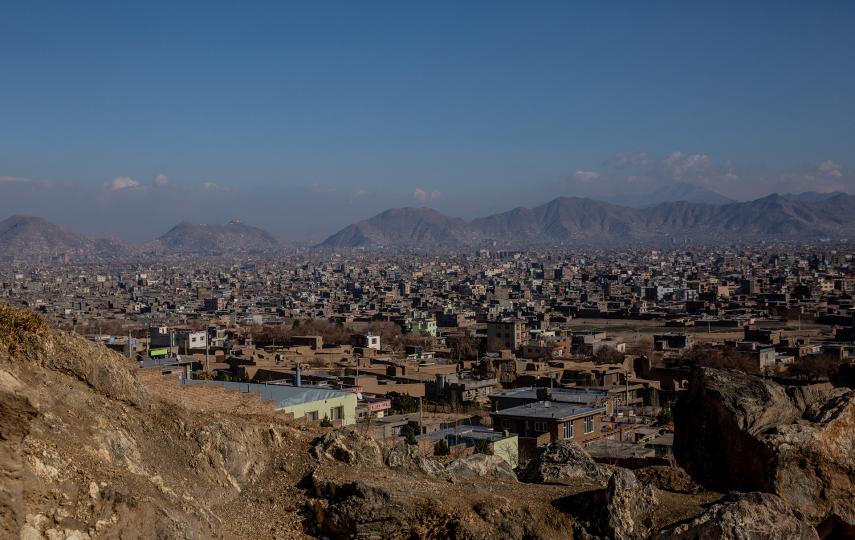When she lost her mother and daughter three years ago, 50-year-old Kanmegne Marie Odile moved to Douala, Cameroon’s business hub, leaving behind her home village, Kekem, in east Cameroon.
By selling herbs used to treat medical illnesses, she makes about US$1 per day. She and her five children spend everything she earns.
Increasingly, she finds it hard to even make that much. “Competition is fierce and customers scarce,” Kanmegne told IRIN. In the small market near her home in Bepanda, a crowded high-traffic area of Doula, she says there are always at least five women selling what she does, aloe vera plants.
Divorced two years ago, Kanmegne says plant sales have not been enough to pay her US$30 monthly rent, which she says her brother-in-law pays for her. She has asked her children to help.
“During their vacations from school, they sell candy in the streets. I know it’s risky because of what they are exposed to, but do you think this is really my choice, faced with the cost of living?”
The mother of five says she has managed to make food last longer by spacing out meals and serving less. “Before, I cooked every day, but now, I cook once every three days. It has been so long since we have seen any meat on our plates.”
Even families whose incomes are above the poverty line have cut back on food. “I have forbidden my family from eating rice and bread,” says Tchuipo Denis, a father of three. “In my opinion, these are not essential to their survival.” He wants them to eat locally-grown products that cost less.
But Denis says he knows his wife still sneaks in bread and rice when he is not home.
The UK-based financial services company, Mercer, ranked Douala as the 34th most expensive city in the world in 2008, based on housing, transport, food, clothing, household goods and entertainment costs.
Local economist Justin Fotsing says since the beginning of 2008, rising prices have hit families harder. “The lifting of long-standing fuel subsidies by the government [in February 2008] has certainly worsened inflation.”
Last February, transport workers went on strike to protest rising fuel costs, rioters took to the streets and youths looted shops.
The strike followed President Paul Biya's announcement that he planned to amend the constitution to run foroffice again in 2011. He has been in power since 1982.
 Photo: Elizabeth Dickinson/IRIN  |
| Rioters burning vehicles and tires in Douala Feb 2008 |
Cameroonian economist Tchokokam Georges said this has made little difference.
“This increase helped the poorest of the poor, subsisting in precarious living conditions. But for those who are not at that level, this change had little impact in reversing the government salary cuts of 1993, [which in real terms is], a 70 percent cut after the devaluation of the CFA Franc [West African currency] in 1994.”
He says that only about one tenth of the population is paid by the government, and that there is no mechanism to guarantee public workers even receive this minimum wage.
“The less people are able to afford with what they make, the more people who will enter the informal economy.”
According to the government’s National Institute of Statistics, there were 250 types of unregulated, non tax-paying businesses 2005.
But even businesses not classified as part of the informal economy lack government controls, said economist Fotsing. Under Cameroonian law, private businesses are required to adjust salaries every two years based on inflation, but many often disregard this law. Still, these salaries are better compared to public wages, Fotsing concludes.
Martin Abega, a director of the Cameroonian Association of Business Owners, says the growth of the informal sector is worrisome and can compromise the country’s economic development. “These companies operate clandestinely, do not pay taxes, or provide any social security to their workers.”
Wamba Jean, a married father of three, had worked for 10 years at such an unregistered company, which supplied furniture to businesses. “One morning in March, the company disappeared.” Jean says he later learned that the company had lost a large contract. “We were never paid and our employer disappeared.”
Martin Mbapeck, an advisor to a government-funded economic growth initiative, says something must be done soon to control costs. “The more expensive life becomes, the more people will be ready to do anything, even kill, in order to eat.”
rk/pt/nr
This article was produced by IRIN News while it was part of the United Nations Office for the Coordination of Humanitarian Affairs. Please send queries on copyright or liability to the UN. For more information: https://shop.un.org/rights-permissions





